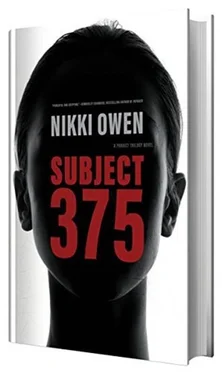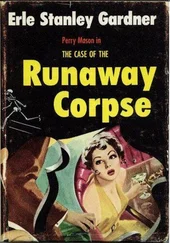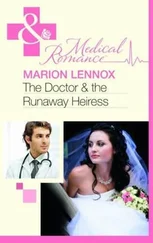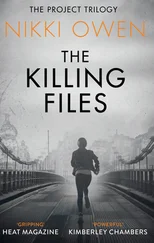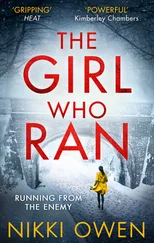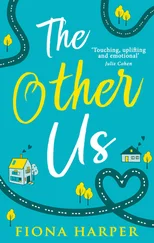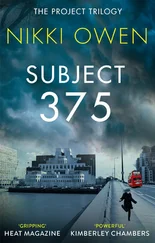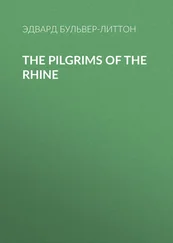I lean forward to read, palms clammy, nervous of what I am about to see. The words ‘knife’, ‘fingerprint’ and ‘trace’ instantly appear. I read on, my anxiety growing. There are details of the body, of how it was found-it is all there: perforating stab wound; nails in the hands; torso sprawled out at the altar; bruises inflicted; restraint used.
‘I want to, with your permission, Maria, revisit the legal principles surrounding the nun’s actions upon the discovery of the body.’ Harry looks at me. I smell him now: a warm fug of tobacco, of icing sugar, of freshly baked bread. I inhale the soothing scent, and my whole body wants to fall into him, to let itself go, let itself be comforted by him, be told by him that everything is going to be okay.
‘So the nun,’ Harry continues, ‘her acting immediately upon finding the priest could have saved his life. It could have broken the chain of causation.’
I snap to, shake off his smell. ‘This chain of causation has never before been discussed.’
‘It should have been.’ He hesitates for a moment. ‘Please be aware, Maria, that to get this conviction overturned, whatever we have must be bulletproof.’
‘“Bulletproof”? That is a phrase meaning “beyond reasonable doubt”.’
Harry nods. ‘The judge should hear your application for permission to appeal any day now. As soon as we know anything, I will inform you. Okay?’
‘Yes.’
Harry begins to slide away the paperwork. I watch him and feel a sudden rush of something that I cannot identify. A feeling. Gratitude? Think. What would Patricia tell me to do? I place one hand on the table. ‘Thank you,’ I say eventually, slow, measured.
He pauses, smiles, then resumes gathering files. We walk to the door. Harry presses the exit buzzer and waits. ‘I hear you helped your cellmate. She tried to commit suicide.’
I swallow. ‘Yes.’
He pats me on the shoulder. I flinch. ‘I’m sorry,’ he says, and lowers his hand. After a second, he smiles again, the type of smile that creases at the eyes. ‘You know, you remind me of my own daughter,’ he says. ‘You’re a similar age. She is strong, like you. Beautiful, too. But then, I am biased.’ He reaches into his pocket and gives me a card. ‘Here. For you.’
I take it. It contains his name, telephone number and address.
‘I will arrange everything for you,’ Harry says. He holds out his hand. I stare at it. ‘I’ll be in touch very soon.’
I wait, then realising that he expects me to shake his hand, I do so. It is large and damp. When I let go, I wipe my palm on the back of my trouser leg.
Harry signals to the guard that he is ready to go.
‘Well,’ Harry says, ‘it was a pleasure to meet you. Take care of yourself, Maria.’
‘Martinez,’ the guard says, as Harry exits, ‘the Governor said you’re to go to the hospital wing immediately.’
Patricia. I hold my breath. ‘Is she alive?’
‘Come on. I’ll take you.’
The IV fluid drips into Patricia’s arm as her chest rises and falls. I watch her, my lips parted waiting for words that cannot come, my hands clenched, worried, restless. She seems so fragile, Patricia, so transparent, like I could poke her, pierce my finger right through her and it would come out on the other side, neither of us hurt.
At the end of the bed hangs her chart. I set down my notebook and stretch across and scan it. It is hard reading. Patricia’s airways have been restricted, the trachea temporarily closing, preventing oxygen from travelling to her lungs. She is alive. But only just. I examine her body, eyes resting on her neck. Red welts snake round it, skin open, pink with pressure. She is lucky to have been revived and I am relieved, relieved that she is here, not gone, not dead in the ground, but with me, now, her friend, her ally.
I return the file to its home and search for a medical torch. There are no nurses in the immediate vicinity, no guards by my side. Locating a torch on the bedside table, I stand then leaning over Patricia, open her lids and check her observations.
‘You took your time.’
I jump at the sound of Patricia’s voice, dropping the torch. It bounces along the floor.
‘Hey, hey,’ she croaks. ‘It’s okay, Doc. It’s okay.’
I touch my cheeks. Damp.
‘It’s okay to cry. You had a shock.’ She is attempting to pull herself upright in bed.
I wipe my face. ‘You must not move yet.’ I link under her arms, heaving her up until her back is resting on the pillow behind. ‘Do you have any signs of dizziness, pain. Nausea?’
She winces. ‘No. I’m fine.’
I sit, shattered.
‘Why did you do it?’ I say, a clock ticking somewhere, the sound of whistling in the far distance.
Patricia looks at her hands. Two, three seconds pass. ‘Ten years,’ she says finally. ‘I’ve been in prison for nearly ten years now.’
‘I know. Why are you telling me this?’
She closes her eyes. ‘I just struggle knowing my family hate me.’
‘They do not hate you.’
‘They do.’
‘I do not hate you.’ She opens her eyes, smiles. My throat feels tight, and I try to swallow, try to feel some moisture, but it does no good. I have nothing left.
‘Hey,’ Patricia says. ‘It’s going to be okay.’
‘You cannot do it again,’ I say, swallowing.
‘I won’t.’
I shake my head. ‘You cannot do it again. You cannot…You are my only friend.’ I smear the tears from my face. ‘I thought you had…’ I sniff. ‘I thought you had died.’
‘You saved my life.’
I hiccup, gulping down air.
‘Doc? Doc, breathe-’
‘I could not help you,’ I say, an unfamiliar burning need to get the words out. ‘I had no equipment and the medical team seemed to take so long to arrive.’
‘Why don’t you-’
‘Why did I not know you were going to kill yourself?’
Patricia pauses. ‘You couldn’t have known. It was my decision.’
‘No.’ I tap my fingers fast. ‘I should have known. But I cannot know, can I? Not being the way I am. Anyone else would have noticed how you were feeling. But not me.’
She sits forward. ‘No one else would have known. Doc, listen to me. No one else would have known.’
My chest heaves up and down. I blink. Patricia’s face swims into focus. I gulp in oxygen, cup my hands over my mouth, peering at Patricia over my fingers.
‘Ssshh. Breathe. Good.’ She reaches out her hand and places it flat on the bed sheet, spreads out her fingers, all five of them, in a star shape.
‘I won’t do it again,’ she says.
Her hand is on the bed. I hesitate at first, then slowly I lower my palm to hers.
‘I am getting out on parole soon,’ she says. ‘The Governor came and told me just before. So, see? I’m going to be okay.’
‘But if you are out of prison, I will be in here without you. I will be alone again.’
She moves her fingers closer to mine.
Our fingertips lay in two star shapes on the sheet, touching now, and in that moment I know that this is the one person in the world I can truly trust.
So I draw in a deep breath, open my notebook and tell her all about the puzzle I am beginning to unravel.
I pour some more coffee. The dark liquid wobbles in the cup, images of the room reflecting on the surface. There one minute, gone the next.
The room is warm, but I shiver. I pull my blazer tight and clutch the coffee cup, but after one sip, I scrunch up my nose.
‘This coffee does not taste normal,’ I say, but Kurt is writing and does not seem to hear me. I repeat the statement, but still he remains silent.
From outside, life continues to drift in through the window; the pictures on the wall sit where they always have; the spiders hunch two by two in the corner, cobwebs forming like icicles in winter. I don’t even know if they are real or not. For some reason, I hold out my coffee cup and study it. It looks normal, ceramic, white. Nothing has changed, everything is just as I remember it. Yet Kurt is convincing me my judgement is impaired. And I am beginning to believe him, but I don’t know why. So much of this puzzle up until now has been solved, yet here I am, wondering what has really happened to me, questioning, again, whether my brain is working properly, and when I say everything aloud, when I put it into concrete words, it all sounds just as everyone has been telling me it does: Like a story. Like a work of fiction. A mis-recollection.
Читать дальше
Конец ознакомительного отрывка
Купить книгу
